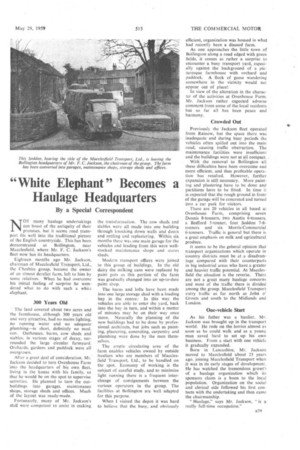"White Elephant" Becomes a Haulage Headquarters
Page 63

If you've noticed an error in this article please click here to report it so we can fix it.
By a Special Correspondent
NOT many haulage undertakings can boast of the antiquity of their premises, but it seems road transport fits well into the traditional picture of the English countryside. This has been demonstrated at Bollington, near Macclesfield, where Mr. F. C. Jackson's fleet now has its headquarters.
Eighteen months ago Mr. Jackson, chairman of Macclesfield Transport, Ltd., the Cheshire group, became the owner of an almost derelict farm, left to him by some relatives. When he had overcome his initial feeling of surprise he wondered what to do with such a white elephant.
300 Years Old
The land covered about two acres and the farmhouse, although 300 years old and very attractive, had no mains lighting, no running water and no adequate plumbing—in short, definitely no mod. con. Outhouses, barns, cow sheds and stables, in various stages of decay, surrounded the large circular farmyard. Orchards, gardens and paddock were all overgrown.
After a great deal of consideration, Mr. Jackson decided to turn Ovenhouse Farm into the headquarters of his own fleet, living in the house with his family, so that he would be on the spot to supervise activities. He planned to turn the outbuildings into garages, maintenance shOps, storage sheds and offices. Much of the layout was ready-made.
Fortunately, many of Mr. Jackson's staff were competent to assist in making
the transformation. The cow sheds and stables were all made into one building through knocking down walls and doors and retiling and replastering. Within six months there was one main garage for the vehicles and leading from this were wellstocked maintenance shops and stores sheds.
Modern transport offices were joined to this group of buildings. In the old dairy the milking cans were replaced by paint pots as this portion of the farm was gradually changed into an up-to-date paint shop.
• The barns and lofts have been made into one large storage shed with a loading bay in the centres In this way the vehicles are able to enter the yard, back into the bay in turn, and within a matter of minutes may be on their way once more. Naturally the planning of the new buildings had to be done by professional architects, but jobs such as painting, plastering, concreting, carpentry and plumbing were done by the men themselves.
The ample circulating area of the farm enables vehicles owned by outside hauliers who are members of Macclesfield Transport, Ltd., to be handled on the spot. Economy of working is the subject of careful study, and to minimize light running there is a frequent interchange of consignments between the various operators in the group. The facilities at Buffington are Well adapted for this purpose.
When I visited the depot it was hard to believe that the busy, and obviously efficient, organization was housed in what had recently been a disused farm.
As one approaches the little town of Bollington along a road edged with green fields, it comes as rather a surprise to encounter a busy transport yard, especially against the .background of a picturesque farmhouse with orchard and paddock. A flock of geese wandering somewhere in the vicinity would not appear out of place!
In view of the alteration in the character of the activities at Ovenhouse Farm, Mr. Jackson rather expected adverse• comment from some of the local residents but so far all has been peace and harmony.
Crowded Out
Previously the •Jackson fleet operated from Rainow, but the space there was inadequate and during busy periods the vehicles often spilled out into the main road, causing traffic obstruction. The maintenance facilities were insufficient and the buildings were not at all compact.
With the removal to Bollington •all these difficulties have been overcome and more efficient, and thus profitable operation has resulted. However, further expansion is still necessary. More painting and plastering have to be done and partitions have to be fitted. In time it is expected that the rough ground in front of the garage will be concreted and turned into a car park for visitors.
There are 20 vehicles in all based at Ovenhouse Farm, comprising seven Dennis 8-tonners, two Austin 64onners, a Bedford 5-tonner, four,Seddon 7-8tanners and six Morris-Commercial 6-tonners. Traffic is general but there is a great emphasis on milk and agricultural produce.
It seems to be the geheral opinion that transport organizations which operate in 'country districts must be at a disadvantage compared with their counterparts in big industrial areas who have a greater and heavier traffic potential..At Macclesfield the situation is the reverie. There are not a great many haulage concerns and most of the traffic there is divided among the group. Macclesfield Transport carry traffic as far north as John o' Groats and south to the Midlands and London.
One-vehicle Start
As his father was a haulier, Mr. Jackson was brought up in the transport world. He rode on the lorries almost as soon as he could walk and as a young man saved hard to set up his own business. From a start with one vehicle it gradually expanded.
Born in Lancashire, Mr. Jackson moved to Macclesfield about 25 years ago, joining Macclesfield Transport when it was in its early stages of development. He has watched the tremendous growth of a haulage organization which its sponsors claim is a boon to the local population. Organization on the social and clerical side followed his first contacts with the undertaking and then came the chairmanship.
"Haulage," says Mr. Jackson, "is a really full-time occupation."




































































































